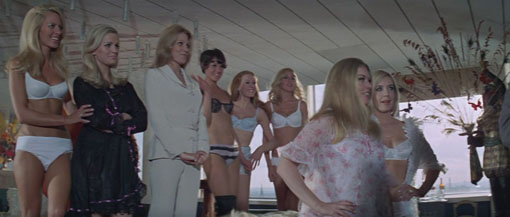Viking Night: The Italian Job
By Bruce Hall
March 22, 2011
That’s too bad, because Charlie Croker (Caine) is quite a guy. When we first meet him, he’s a daffy, dapper bandit just finishing a stint in what looks like the nicest white collar joint I’ve ever seen. I mean that had I reason to believe the prisons in the United States were this nice I might have stolen a Porsche instead of applying to college. The cells look cleaner than my dorm room was, the prisoners eat more often than I did and the uniforms are nicer than what I was wearing at the time. At any rate, think of Croker as James Bond’s slightly less talented, slightly less handsome younger cousin. He has the same champagne taste, but works without access to the Queen’s bank book.
In the network of scum and villainy that is London’s criminal underground, nice things take a lot more effort to come by. But by the time he’s made his way to his tailor and snagged himself a Bond-worthy set of wheels, Charlie is ready for life on the outside. At first he seems content to live out his days as a professional party guest. But it turns out that the death we saw at the beginning of the film was of Croker’s closest friend and mentor. Charlie is whisked to a meeting with the man’s widow, who fills in her ersatz brother-in-law on the reason her husband is dead.
It turns out Charlie spent his career looking up to the right man. His old partner leaves behind plans for a heist so daring, it promises to make a living legend out of whoever can pull it off. Croker can’t resist the challenge, which is good, because otherwise there’d be no movie. The plan involves hacking the computer traffic grid that runs in Turin, Italy. Using the snarled traffic as cover, the gang would rob a Mafia gold shipment in broad daylight. They would escape using modified cars driven by professionals on a pre-planned route. Before La Cosa Nostra knows what happened, the crew escapes the country and spends the summer on a beach somewhere, drinking pina coladas.
A heist like that requires a large crew, and putting together that kind of talent tends to draw attention. The mob gets wind of the plan and does its best to keep it from happening. Since this is a heist film, you should know how it goes from there. The robbery is a given, and it always goes off without a hitch, except for the one wacky thing nobody thought of. This much we know, but where these kinds of movies differ from one another is in tone and execution.
And that’s where The Italian Job makes itself memorable. What makes the heist movie genre in general much fun is that while you’re generally expected to follow the usual script, there’s still wide latitude for interpretation. You can make drama out of it, like Heat, or you can make it campy fun, like The Pink Panther. You can make it pretty much anything in between; most audiences will still identify with the material. The Italian Job succeeds at this, sitting right square in the middle of these two extremes. The stakes never quite feel as high as they usually do when Robert De Niro is involved, but the film still feels more innovative than trivial. Computer hacking and car chases as performance art were edgy concepts 40 years ago, and European audiences no doubt found this romantic and exciting. It also has the unintended effect of making the film seem a lot more contemporary than it is. While you’re watching, if it weren’t for the bell-bottom pants, wide lapels and sideburns, this movie might have been made a decade ago instead of the year men first walked on the moon.
Continued:
1
2
3
|
|
|
|




